What does the new reporting about Kenneth Chesebro mean?
A little mea culpa in advance of tonight’s newsletter. My proofreader is out sick. And my backup proofreader is out sick. Get your Covid and Flu vaccines folks! It’s a jungle out there. My apologies in advance for any typos or inartful phrasing that have escaped my attention at the end of a surprisingly long, full week for the holiday season!
CNN had a lengthy piece late Thursday on Kenneth Chesebro’s statement to prosecutors in Michigan (he is also talking to prosecutors elsewhere), that included his emails with others involved in the fake electors scheme and some audio of his statement to prosecutors. You will recall that Chesebro is a Harvard educated lawyer, who has been attributed with the role of architect of the fake electors scheme. Chesebro was charged in the Fulton County case, where he pled guilty, but with an asterisk. Chesebro continues to maintain that there was nothing illegal about the fake electors scheme. He pled guilty to one felony count of conspiracy to file false documents. He continues to maintain through his lawyer that the fake electors scheme was a legitimate strategy, put into play to protect Trump's legal options. Chesebro’s attorney has said Trump has nothing to fear from his testimony.
So, Chesebro doesn’t look like a cooperator in the traditional sense. Cooperation means pleading guilty, making a full confession, and agreeing to testify against others. And that doesn’t seem to be what has happened here, making the deal Chesebro got in Fulton County, something of a mystery. Chesebro, at least on the surface, isn’t much of a witness for the government. It seems like he would testify there wasn’t an illegal conspiracy to interfere with the results of the election. In some cases, cooperating witness’ statements evolve overtime. Every prosecutor has put a cooperator on the stand who started out with lies, maintaining their innocence, but evolved progressively over time towards the truth—which then had to be corroborated with other evidence and a candid confession to the lies as well, as the crimes. But that doesn’t seem to be what’s happening here, either.
Chesebro, and his “cooperation” remain something of an enigma, which makes this new report all the more interesting. Is Chesebro being more cooperative with prosecutors in Michigan? Has he finally had his come to Jesus moment? But much of the story is not new. The Washington Post, for instance, reported previously on his proffer in Georgia. But the CNN story is illuminating when we put it in context with everything else, and particularly with what we already know from the work of the January 6 committee.
Perhaps the most interesting new detail comes midway through the story, when we learn that prior to Chesebro’s guilty plea in Georgia, his lawyers reached out to Smith’s team. But they have still not received a response (or an invitation to proffer as have others, like Rudy Giuliani) from prosecutors. No reason is offered for this.
CNN obtained access to audio of some of Chesebro’s proffer with Michigan prosecutors, however. He has apparently been on the circuit, speaking with prosecutors in a number of different states where there are investigations in progress. The audio reveals a petulant, childish witness, upset about what he perceives as lies told about him by other Trump campaign lawyers and his financial problems. You can read the entire report from CNN here.
In the audio, Chesebro has an axe to grind with top Trump campaign lawyers, who emails reveal were in the thick of the fake electors committee along with him. “I don’t have a really warm feeling toward, at least, the top Trump lawyers that did this, hid from me what they were doing and then lied to Congress about me. So, it’s been really difficult,” Chesebro is heard telling prosecutors. He complains that "what really rankles" is that top Trump campaign lawyers claimed they had abandoned the scheme by mid-December, when, in fact, they stayed in to the bitter end, and then, threw Chesebro under the bus when congressional investigators came knocking at their door.
Chesebro tells prosecutors, "if I had known the true facts I would've come forward, I would have cooperated with January 6 knowing that I could disclose all this information because I was under suspicion because they had lied to Jan 6 about me." This comment makes no sense. Perhaps it would if we heard more of this conversation with them, the reporting only has outtakes, but what true facts is he talking about? And why wouldn’t he have come forward, especially if he believed he’d done nothing wrong? There would have been no reason he wouldn’t share truthful information with investigators. As for throwing him under the bus, the publicly known information, including his own guilty plea, confirms that he put himself under those wheels.
In other words, none of this makes sense. It suggests some of the folks he worked with, who avoided indictment in Fulton County, may have some culpability—we’ll get to that. Several of them have reportedly spoken with either federal or state prosecutors, or both and remained silent since, possibly suggesting cooperation in the real sense of that term. But none of this is exculpatory for Chesebro.
In a final audio clip, Chesebro complains about losing his $2 million apartment in Manhattan and paying for lawyers. Curiously, he doesn't say anything about being indicted. It’s passingly odd to hear someone who has pled guilty to a felony and has possible exposure in other jurisdictions focused only on money. Perhaps, again, we’re only hearing a portion of his statement. But what we can hear doesn’t hit as the contrite statement of a truly remorseful person who has become a valuable witness. To the contrary, he sounds aggrieved.
There are other people involved in Chesebro’s story. One name, Michael Roman, may ring a bell. Roman was a staffer for Trump while he was in office from 2017 to 2018 and became director of election day operations for 2020. Roman was indicted in Fulton County, Georgia, along with Chesebro, on charges including conspiracies to commit forgery, make false statements and writings, impersonate a public officer, and file false documents, along with the RICO charge. I wrote about his involvement in the scheme here back in August, and the piece is worth reviewing if you want to get up to speed on Roman. He had some direct contact with Trump and appeared to be cooperating with federal prosecutor in June of this year, but nothing seems to have come of it and he was subsequently indicted in Georgia.
Then there’s Matthew Morgan, a lawyer who joined Vice President Pence’s office in 2017. According to his testimony to the January 6 committee, he left that office to work on the Trump reelection campaign in March 2020. He served as the campaign’s general counsel until November, he told the committee, when Rudy Giuliani took over litigation and he stayed on as what he called a sort of “corporate counsel to the entity overseeing corporate responsibilities,” and was not involved in any litigation, presumably over the outcome of the election. He said he left the campaign at the end of January 2021. Morgan has never been charged and it’s unclear whether he is cooperating with any prosecutors. He told the committee that once Giuliani took over litigation, lawyers quit the campaign in droves because their firms weren’t comfortable with the kind of arguments he was making in court. Another witness before the committe, Trump campaign adviser Jason Miller testified that Morgan though John Eastman, who also worked on the fake elector scheme, was “crazy.” During public hearings, the committee played footage from Morgan’s interview of him saying that the plan to convene electors in states Trump lost was inappropriate. His interview with committee staff was a friendly, collegial affair.
Chesebro has a different view. CNN reported that, "Chesebro told Michigan investigators that his own emails show that Morgan remained deeply involved, including in the final hours before January 6, to ensure that the certificates from the slates of fake electors reached Washington, D.C. in time. The emails, which can be found here, seem to confirm that version of events. There are seven pages of them, beginning on January 4, 2021.
Mike Roman kicks off by saying the materials from the fake slates of electors will be transported by two different (Congressional) staffers. Chesebro responds they’ll need staffers to “get them in”—presumably to the Capitol as votes are being counted. Roman tells Chesebro he still needs Michigan and Wisconsin. Then Chesebro writes they’ll need a staffer for one of the 11 Senators—the states with fake electors—and a staffer for Mike Pence. That seems to refer to Chesebro’s decision to have the Senator’s side hand off the ballots to Pence.
The centrality of Chesebro’s role in the scheme is apparent throughout the exchanges, as in this email to Mike Roman:
As they game out the details, Roman suggests chartering a plane due to concerns about flights getting in on time ahead of the vote. Roman is in touch with Wisconsin Senator Ron Johnson. You may recall that Johnson faked being on a phone call in order to avoid a reporter’s question about his roll in the scheme, when it surfaced during the January 6 committee hearings.
But the emails shed some light—the plan was for Johnson to transfer the fake electors’ ballots to Pence. The committee revealed text messages that showed a Johnson aide advising a Pence aide that Senator Johnson “needs to hand something to VPOTUS please advise.” After being told that it was “alternate slates of electors” for Michigan and Wisconsin, Pence’s aide ordered, “do not give that to him.” Matthew Morgan entered the chat later on January 4 as the discussion about transferring ballots from Johnson to Pence continued. He suggested the plan was flawed and they needed a staffer to take the ballots into the Capitol. Apparently that’s what Morgan meant when he told the January 6 committee he was just doing corporate stuff at this point.
Morgan seems to have been more involved than he encouraged the January 6 committee to believe. Although he told them that he became uncomfortable with the fake electors plan by mid-December and that he separated himself from the plan at that point so that he had “zero” responsibility for it, this email and Chesebro’s testimony suggest that wasn’t exactly the case. Morgan was in the thick of things at least until January 4, 2021. CNN characterized it this way: "Ultimately, on the eve of the joint session of Congress, Morgan helped get the ballots in place, according to the emails and according to Chesebro, who blamed his legal troubles squarely on the Trump campaign’s legal team."
The emails between the three, Chesebro, Roman, and Morgan, suggest that they were working alongside Giuliani; that they were they key players executing the details of the fake electors scheme and making sure it came off.
Whatever role others played, Chesebro’s is clear. There is a final email from a lawyer who was working for Morgan on the campaign to him. In it, responsibility for and an update on the status of each state where the fake electors plan was in progress is turned over to Chesebro.
And yet, Chesebro continues to maintain, as he has all along, that the plan was perfectly legal. His lawyer said after his plea in Georgia, that “I think this plea absolutely shows and proves that he [Chesebro] was not and never was the architect of any sort of fake elector plan and anything like that.” This despite the fact that it was Chesebro who added hedging language, qualifying the fake certificates for Pennsylvania and New Mexico in an attempt to make them look more kosher. There is reporting he wanted to do that in all seven states, but Roman shut him down. No matter what he said then or now, Chesebro entertained at least some doubts about the propriety of the scheme. And Ryan Goodman from Just Security, which maintains a clearinghouse of Trump prosecution related materials, pointed out to me that the word “Fifth,” as in, I’m asserting my Fifth Amendment to avoid responding to your question because the answer might incriminate me, appears 143 times in Chesebro’s testimony to the January 6 committee.
It is a tangled web. Just like we learned a great deal from the public hearings the January 6 committee held, we’re likely to learn more when, if, this case goes to trial. Trump is the only defendant in Washington, D.C., but even the larger range of defendants in Georgia fails to reflect all of the people who played roles, big and small, in the effort to end democracy in this country by overturning a lawful election. Many of these folks, including some whose conduct could be categorized as technically lawful, but still awful, are still out there practicing law or participating in politics. We need a full accounting, both in criminal courts but also in the historical record, so that one day, we will be able to appreciate, and hopefully learn from, the whole sweep of conduct that led to January 6. Beyond the criminal case and the legal details, that’s what this new story about Kenneth Chesebro suggests to me, that we need more than just prosecutions, as much as we need them. We also need a full version of the truth.
There’s a lot to digest here, but it’s important stuff. The full story is incredibly complicated, but it’s essential to getting through the coming year, when the fate of our democracy will be determined at the polls. Hopefully by this time next year, we’ll be making the transition to strengthening our institutions through understanding what we’ve been through and establishing the kind of civics education that makes them stronger. I look forward to that moment. Thank you for being here and for reading Civil Discourse. Without your support, I couldn’t do this work.
We’re in this together,
Joyce


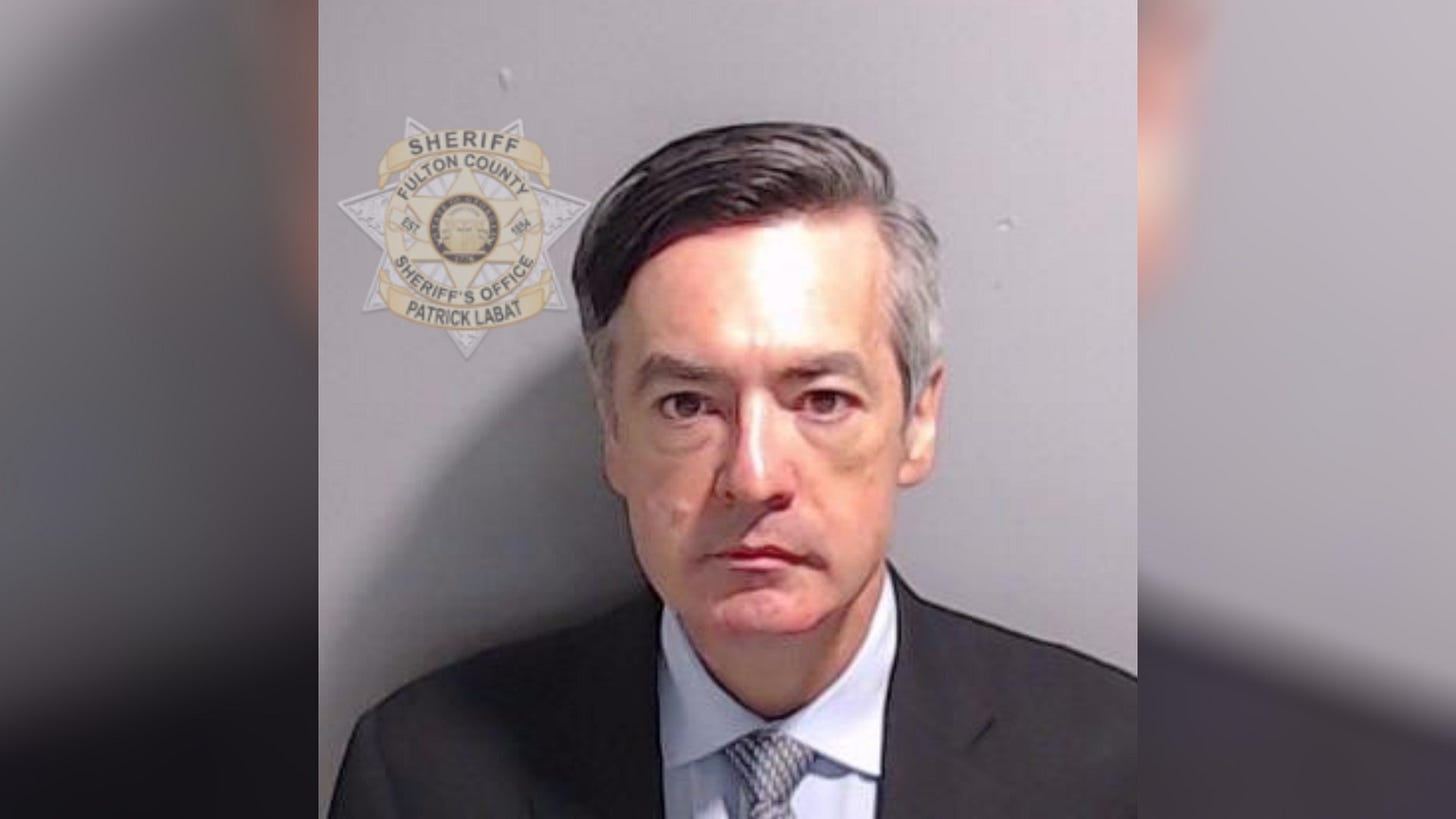
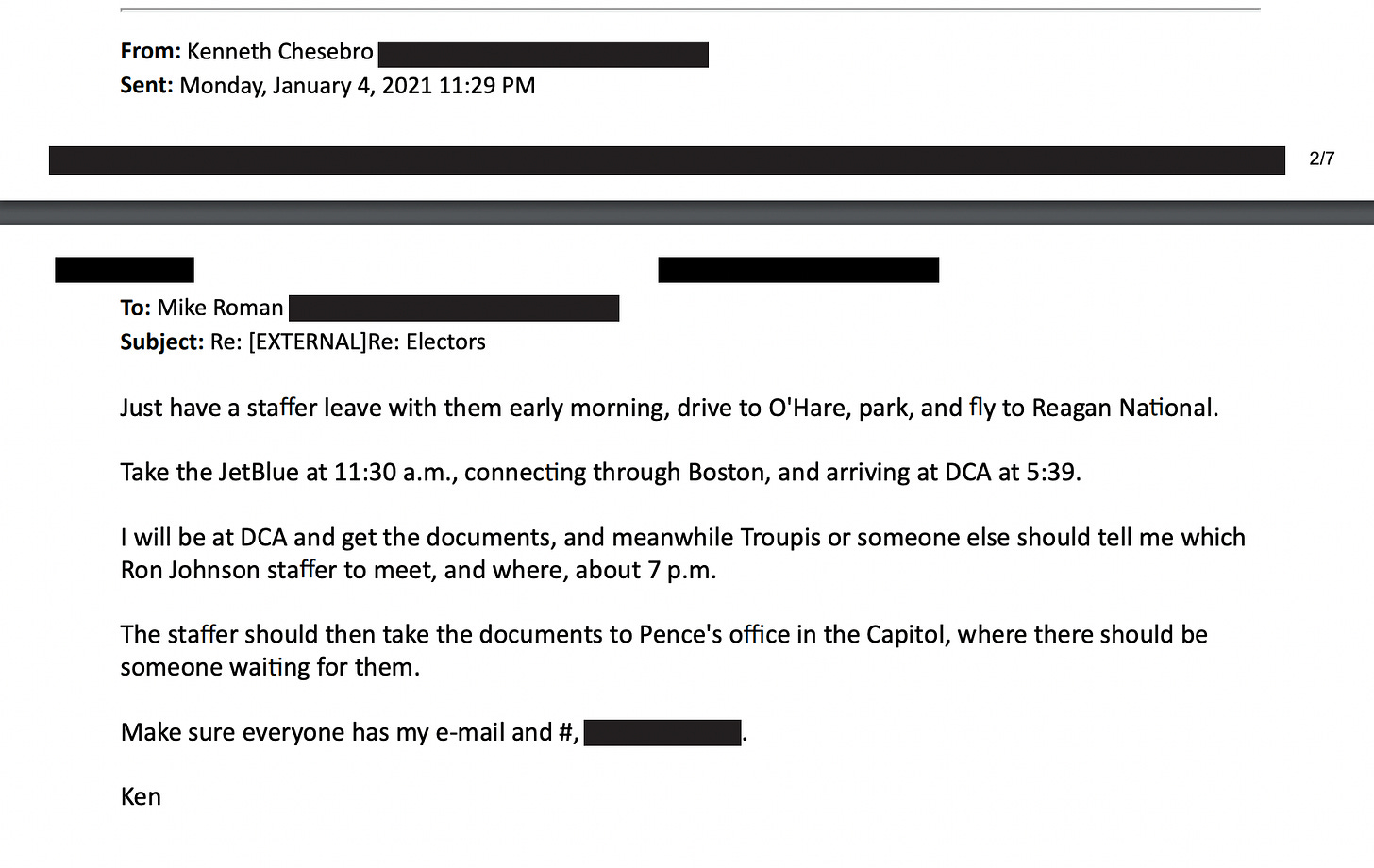
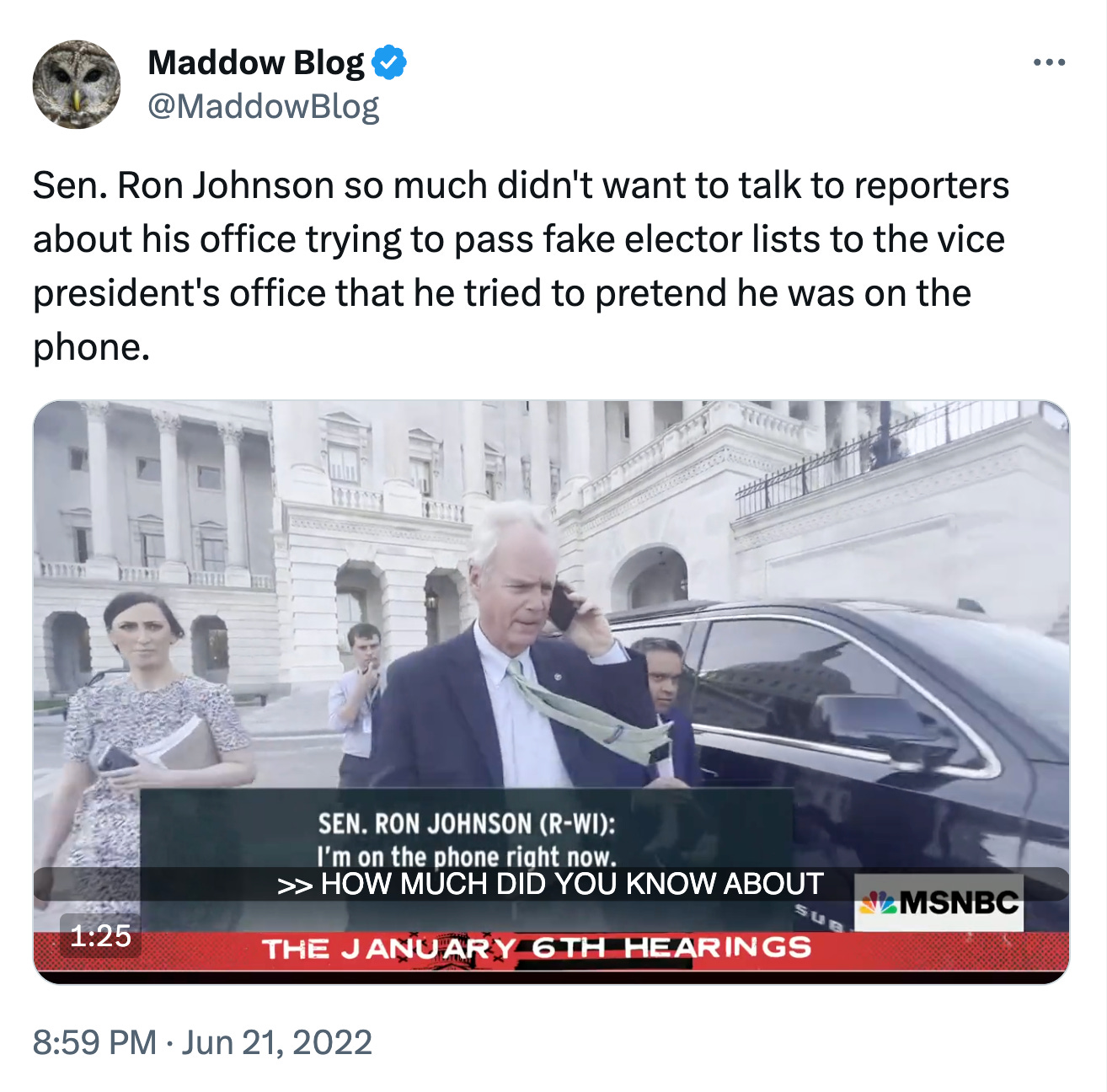
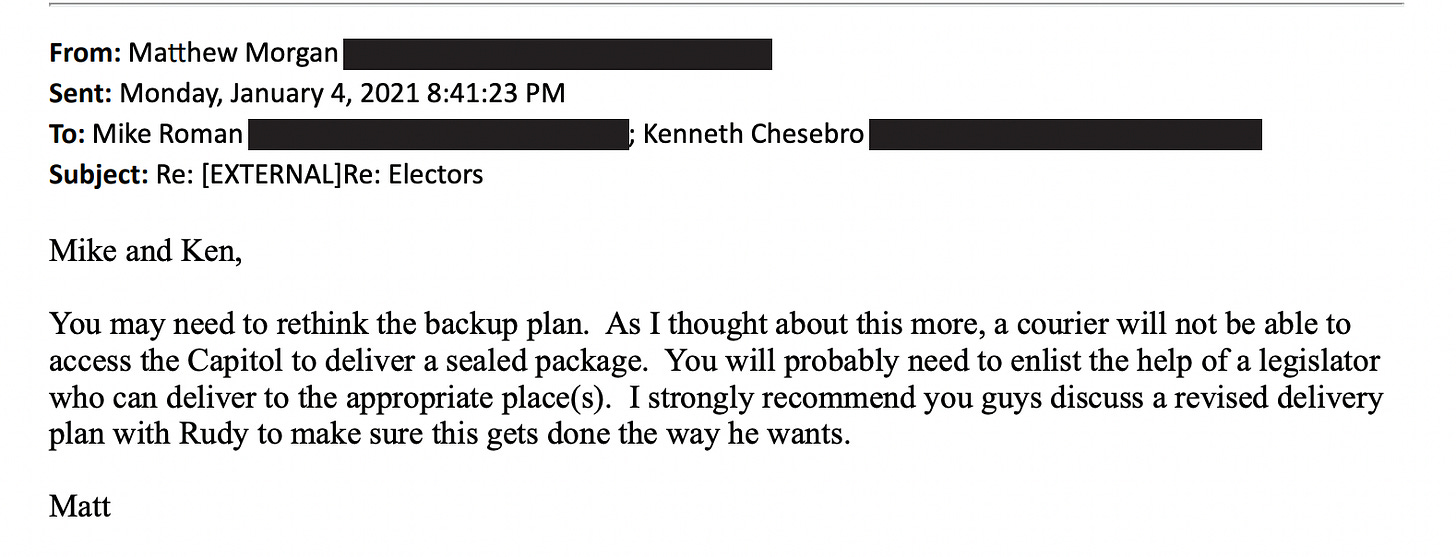
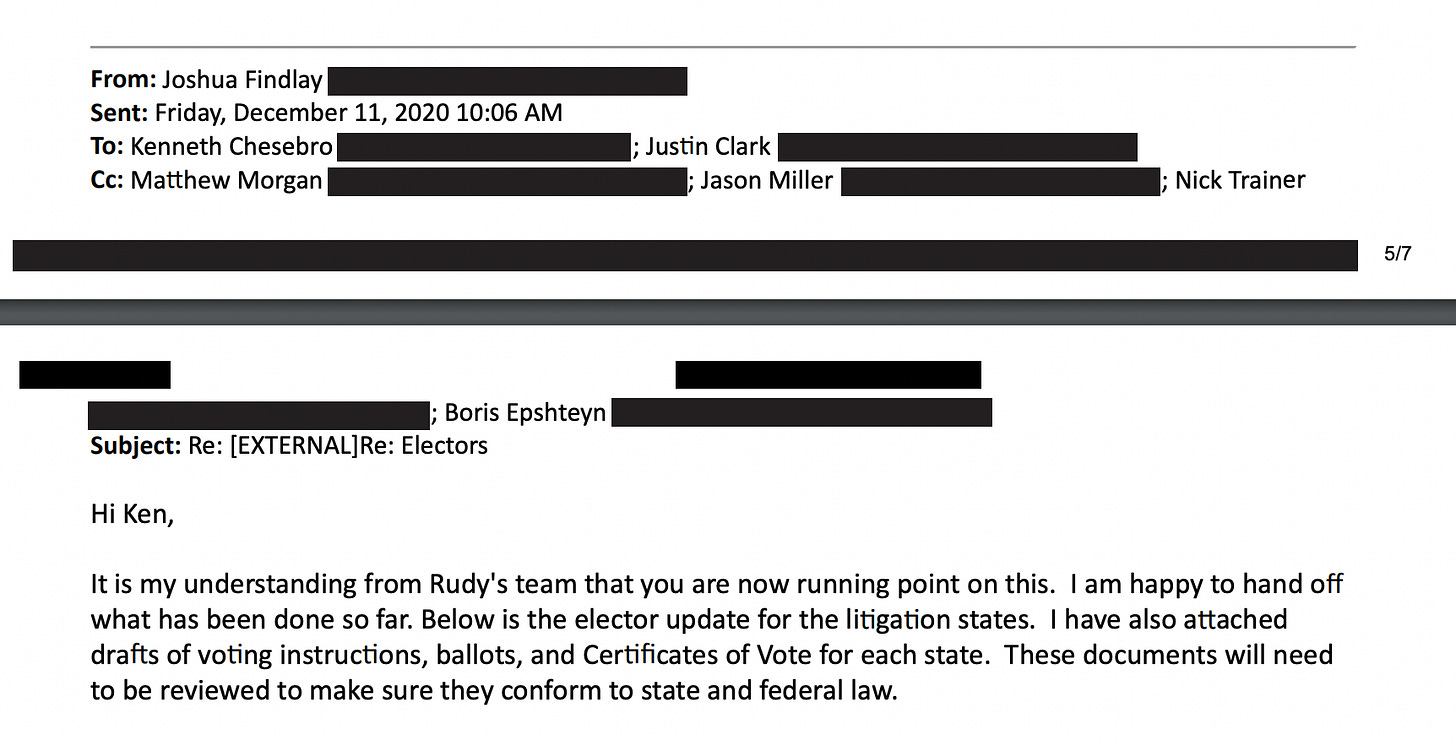
Thank you, Ms. Vance. You are an immense help to us non-lawyers.
Seems there may be more members of the House and Senate who are getting the butterfly wing treatment. They need to be asked the hard questions too. Ted Cruz and Mike Lee for starters.